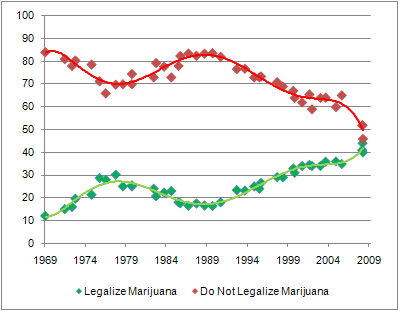Links to polls mentioned in article at the 538 article
Americans Growing Kinder to Bud- Nate Silver
We all know that Michael Phelps was on something. But perhaps he was also onto something. Three recent polls show that Americans are more sympathetic to the idea of legalizing marijuana than ever before.
The first poll, conducted last week by Rasmussen Reports, has 40 percent of Americans in support of legalizing the drug and 46 percent opposed. The second, conducted in January by CBS News, has 41 percent in favor of legalization and 52 percent against. And a third poll, conducted by Zogby on behalf of the marijuana-rights advocacy group NORML, has 44 percent of Americans in support of legalized pot and 52 percent opposed.
That all three polls show support for legalization passing through the 40 percent barrier may be significant. I compiled a database of every past poll I could find on this subject, including a series of Gallup polls and results from the General Social Survey, and could never before find more than 36 percent of the population (Gallup in October, 2005) stating a position in favor of legalization:

Several cautions and caveats apply, however. Firstly, although support for legalization has grown, it remains the minority position. Secondly, although there has been a long, slow-moving upward trend in favor of legalization since roughly 1992, there is no guarantee that public sentiment will continue to move in that direction: support for legalization had grown to about 30 percent in the mid 1970s before dropping significantly during the Just Say No years of the 1980s.
Still, the position no longer holds the stigma that it once did. About as many Americans now support legalizing marijuana as do de-legalizing abortion. The past three Presidents have admitted, more or less, to marijuana use. Thirteen states have some form of decriminalization on the books, while fourteen permit medical use of the drug, although it is not clear how robust those provisions are as they are superseded by federal law.
The pro-legalization position may have some generational momentum as well. According to an AARP poll conducted several years ago, while just 8 percent of Americans aged 70 or older had ever tried pot, lifetime usage rates grow to 58 percent among 45-49 year olds.
This is probably not one of those issues, however, where Washington is liable to be on the vanguard. When Barney Frank introduced a bill last year to decriminalize pot, it got only eight co-sponsors, one of whom subsequently withdrew her name. And President Obama has steered clear of any suggestion that he might move to legalize or decriminalize pot, in spite of some earlier statements on his record to the contrary.
My guess is that we'll need to see a supermajority of Americans in favor of decriminalizing pot before the federal government would dare to take action on it. If the upward trend since 1990 holds (and recall my earlier caution: it might not), then legalization would achieve 60 percent support at some point in 2022 or 2023. About then is when things might get interesting. But I'd guess we'll see other some other once-unthinkable things like legalized gay marriage first.